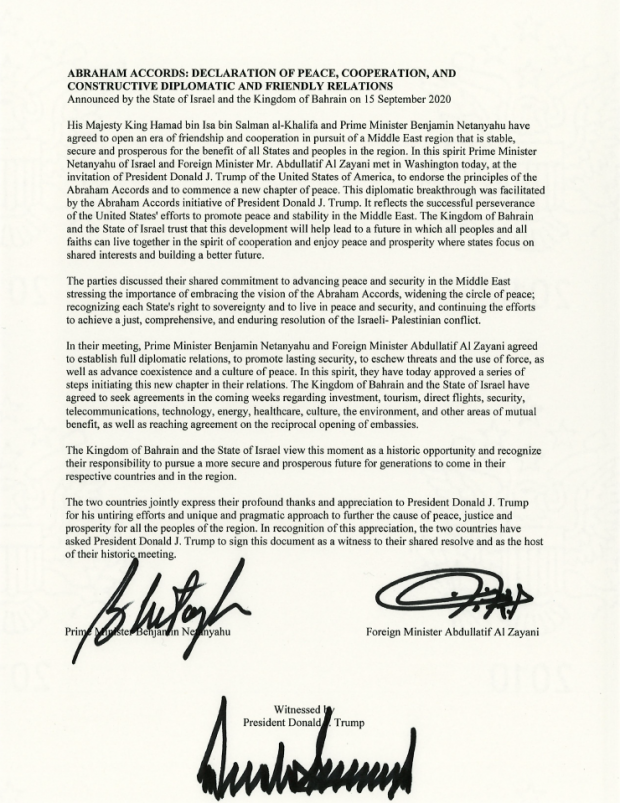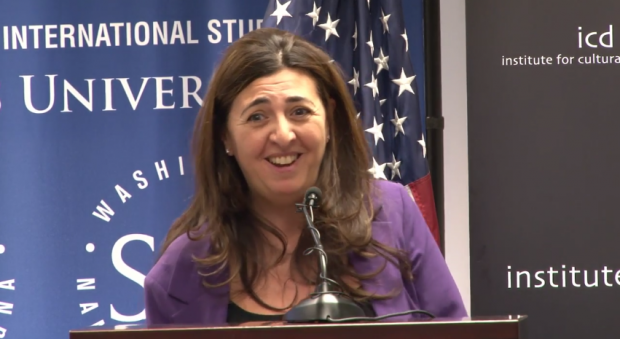
Bahrain: Agreement with Israel aims to boost chances for peace in Middle East

By Habib Toumi
BAHRAIN: Since the signing of the declaration to support peace by Bahrain and Israel almost one month ago, contacts between officials from the two countries have been intensifying amid promises to build on the agreement to move closer to peace, security and cooperation across the region.
For Bahrain, the agreement “emanates from the spirit of coexistence for which it has always been known” and is in line with its vision “to reach comprehensive peace as a strategic option to promote the peace and stability processes in the Middle East, which will contribute to consolidating global security and peace.”
King Hamad said that the declaration signed at the White House on September 15 “is a significant historic step towards achieving comprehensive peace across the Middle East and realizing the aspirations of the peoples of the region and of all religions, for security, stability and progress.”
“Among the goals that we envisioned and sought to achieve through the declaration supporting peace is to make the world recognize that peace is our message and strategic option and that tolerance and coexistence are among the most important characteristics of our authentic Bahrain identity. We are tolerant, and we love peace and coexistence,” King Hamad said as he chaired the Cabinet session.
He explained that true coexistence and real peace are based on the acceptance of the others.
“This is the core of the Bahraini identity and the essence of the Bahraini citizens and their deep-rooted characteristics. We boast that our people is among the kindest on earth and this kindness has entitled Bahrain to be a beacon for intellectual, cultural, religious and sectarian diversity,” he said.
While the agreement between Bahrain and Israel was hailed as a breakthrough in many capitals, there were claims it was directed against the Palestinians and countries in the Middle East. However, Bahrain flatly rejected the allegations and insisted that it does not target any state or people.
“We affirm that our steps towards peace and prosperity are not directed against any entity or power. In fact, they are in the interest of everyone and aim at ensuring good neighborliness and working for it,” King Hamad said.
He reiterated Bahrain’s “firm and unwavering stance in support of the Palestinian cause and commitment to achieving the two-state solution, including the establishment of an independent Palestinian state with East Jerusalem as its capital, in accordance with the Arab Peace Initiative.”
Bahrain has a small community of around 45 Jews who have been represented in the upper chamber of the bicameral parliament since 2001. The community has its active Jewish cemetery and a synagogue.

Hoda Nonoo, a former head of a Bahraini human rights society, was the first Arab Jew to be appointed ambassador to the US. She serbed five years from 2008 to 2013 before going back to Bahrain.
Most of the Jewish families have come from Iraq around 140 years ago looking for opportunities in Bahrain.
Today, many of them proudly display their recognizably Jewish names on their shops in the capital Manama.
The community was prompt to show their full support to the agreement between Bahrain and Israel.
“On the historic occasion of furthering peace in the Middle East and the joint statement of the United States, the Kingdom of Bahrain, and the State of Israel, the Bahraini Jewish community congratulates our leadership on this momentous occasion,” Ebrahim Dahood Nonoo, the head of the community, said in a statement.
“We would like to thank His Majesty King Hamad bin Isa Al Khalifa for having the foresight to go ahead with this decision and for his belief in co-existence and his faith and ability to break down the barriers that restrict cohabitation. We look forward to a prosperous relationship benefiting both countries.”
The Bahraini Jewish community is an indigenous community having been in Bahrain since the late 19th century, he added.
“The Jewish community has existed in the Kingdom of Bahrain and is the only indigenous community in the Gulf. We have both a synagogue and a cemetery operational to this day. This is a historic moment that we have never expected to see in our lifetime,” said Nonoo, the first Jewish representative in the Shura Council.
“Although our numbers are small, we are very well integrated into the fabric of the society, both in business and in culture.”


